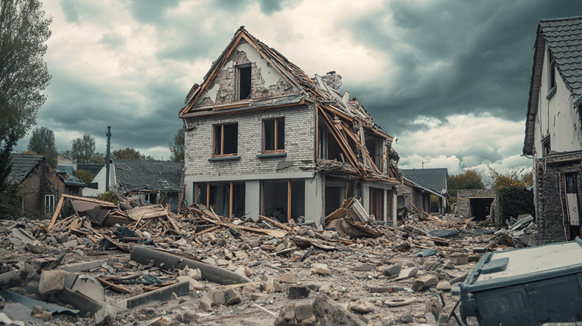Disaster-Proof Your Finances: What Every American Should Know Before the Next Big Storm

Hurricanes, earthquakes, wildfires, floods—it feels like every summer now comes with its own set of disasters. In recent years, states like California, Florida, and Texas have taken a beating, and Puerto Rico was hit so hard it’s still recovering. While it's easy to think, "That won't happen to me," one glance at the news should be enough to remind you: natural disasters don’t discriminate. And when they do strike, they hit more than just your home—they hit your wallet.
So here's the question: If disaster strikes tomorrow, are you financially prepared? Most people aren’t. But the good news is you can take a few proactive steps now to safeguard your finances and bounce back faster if the worst happens.
Get Ahead Before Trouble Hits
Let’s face it—once a hurricane is on the radar or the skies are filling with wildfire smoke, it’s too late to scramble for paperwork or sort out insurance. Preparation needs to happen before the storm clouds roll in. Here’s how to build a solid financial game plan:
- Keep Cash on Hand
If ATMs go down or retailers lose power, cash is king. Stash away $100–$500 in a safe spot in your home. It could be the difference between fueling up your car or being stranded.
- Take Photos and Videos of Your Stuff
Do a quick walkthrough of your house with your phone. Record your electronics, appliances, furniture—anything of value. Save it to the cloud, your phone, and a flash drive. That evidence could speed up your insurance claim dramatically.
- Download the Right Apps
Have mobile apps for your bank, insurance company, and FEMA pre-installed and updated on your phone. You’ll be thankful when you’re on the move and need to check balances, file claims, or locate disaster assistance.
What to Grab If You Need to Leave Fast
If you’ve got to evacuate—whether you’ve got 48 hours or just 5 minutes—your "safe box" should be ready to grab and go. Here’s what to put in it:
- Insurance policies – For your home, renters, and auto coverage.
- Property deeds and car titles – To prove ownership when it counts.
- Credit card & mortgage info – Contact lenders ASAP for possible payment deferrals.
- Utility bills – To show your address or dispute service charges.
- ID, passports, birth certificates & Social Security cards – These are a pain to replace; don’t leave them behind.
- Insurance cards, medical records & prescriptions – For you, your family, and your pets.
- A printed contact list – Phones die. Numbers on paper don’t.
Pro tip: store all of this in a waterproof, fire-resistant pouch. Better yet, make copies and scan them into a secure cloud folder or flash drive. Don’t store them in the obvious places thieves will look either! Don’t keep them in your office or in your bedroom closet & dresser, that’s the first-place thieves look! That old diaper box in the garage, or box of cleaning supplies under the kitchen sink is a much more discrete location to hide these vital items!
Don’t Forget: It’s Not Just About What You Own
In moments of panic, we rush to save things—photos, heirlooms, that wedding ring from Grandma. But the most powerful tool in your recovery isn’t sentimental—it’s documentation. Having your financial records, IDs, and insurance info at the ready can make the difference between a smooth recovery and a months-long bureaucratic nightmare.
And one more thing: scammers love chaos. When FEMA is involved, so are fraudsters. Having your financial house in order helps you avoid shady operators and protects your identity when you’re at your most vulnerable.
Hope for the Best, Prepare for the Worst
Nobody wants to think about disasters until they’re living one—but by then, it’s already too late. The time to prep is now, when the skies are clear and the pressure is low. It doesn’t take much time, but it could save you months of stress and thousands of dollars down the line.
Hopefully, you’ll never need to use your safe box. But if the time comes, you’ll be glad you planned ahead—not just for survival, but for financial recovery that puts you back on your feet fast.